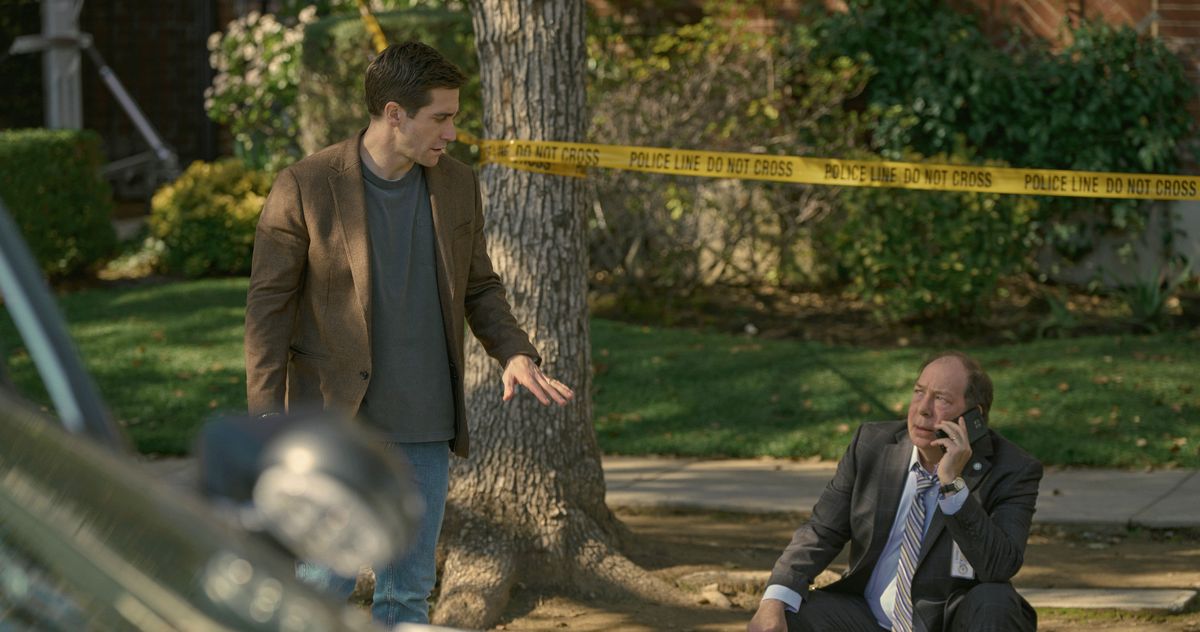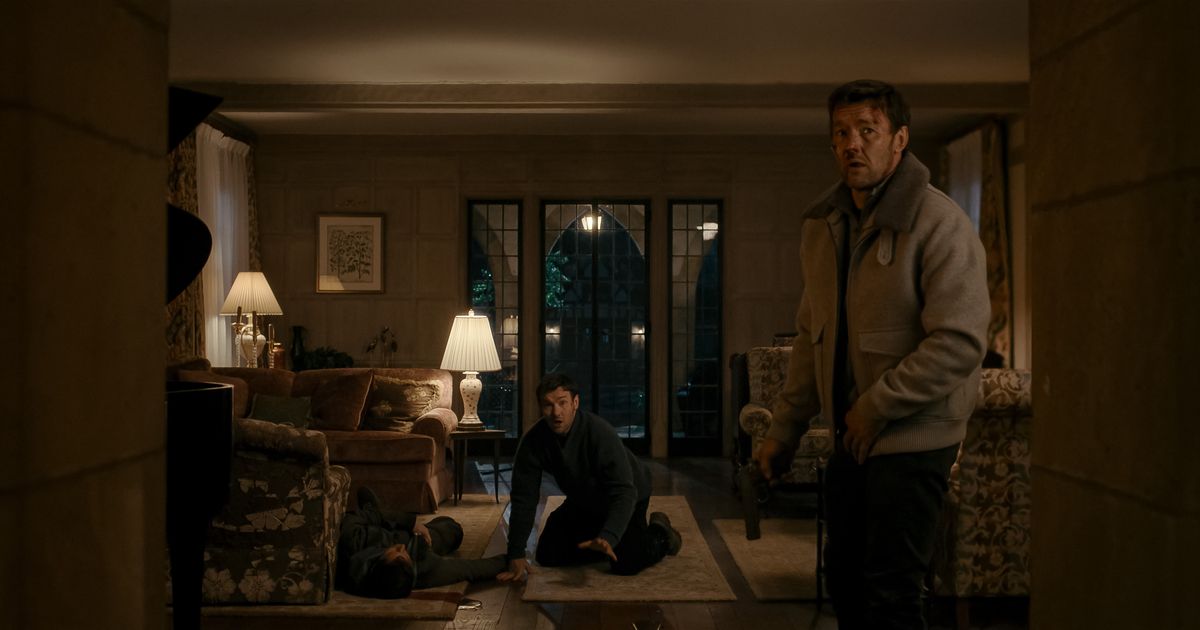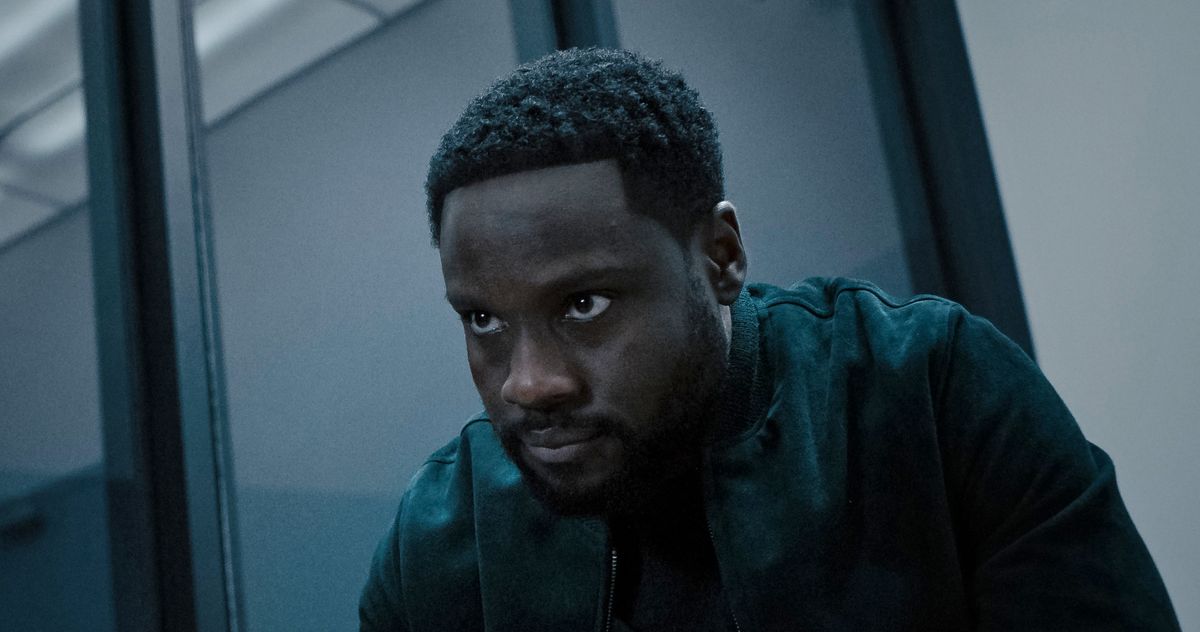Most legal thrillers have one of two kinds of lawyers as protagonists. The first is a young, driven type who is disabused of his idealism as he — always a he, except for paralegals and/or Julia Roberts — becomes privy to the machinations and corruptions of judicial power. That’s Tom Cruise in The Firm: tormented by his commitment to do what’s right and the realization of his own smallness in the face of the system. Then there’s the kind of lawyer who is already disillusioned and, through some pivotal experience, regains faith in the system. That’s Paul Newman in The Verdict: a weary, alcoholic attorney revived by a medical-malpractice case that puts him back in the courtroom.
Presumed Innocent, on Apple TV+, centers on a third, indeed a more sinister, type of lawyer. As a chief deputy prosecutor in Chicago, Rusty Sabich (Jake Gyllenhaal) is the right-hand man to prosecuting attorney Raymond Horgan (Bill Camp). It is his job to uphold the system he knows so intimately, and his faith in “justice” is indistinguishable from his faith in his own power. This is to say he has an ego the size of Lake Michigan. “Bases Loaded” opens with Rusty addressing a jury directly: “Sitting on a jury, that is a high calling. And being entrusted with the prosecution, satisfying the burden of proof, that is also a high calling. I will live up to my duty, and I ask that you rise up to yours.”
His confidence won’t last long, though. Rusty is practicing curveballs with his son, Kyle, when his all-American idyll is interrupted by a call from Raymond, who delivers the news that one Carolyn Polhemus has been murdered. There’s no sign of breaking and entering at her house, and her body has been horrifically hog-tied. In the 1986 book by Scott Turow on which the show is based, her “spectacularly lithe” body, which “retains its erotic bearing” and seems “supple and athletic” even in its mangled state, is described as “an ugly tormented bow.” Rusty needs to take several breaths before he heads to the P.A.’s office with the rest of the county prosecutors, where we are introduced to some office politics. Rusty simply “must be in charge.” A tableful of strong personalities flares up at this assertion. Nico Della Guardia (O-T Fagbenle), who is running for prosecuting attorney in an upcoming election, and Tommy Molto (Peter Sarsgaard!), his chum, want to know why him. Rusty’s answer? Raymond said so, and besides, he’s simply better than Tommy. Raymond is still the P.A., so he gives Rusty the case and tells everyone else to fuck off.
By this point in the pilot — about five minutes in — I’ve already decided Raymond’s word is gospel to me. Henceforth, I will be on his side no matter what happens. He is everything I love about a movie lawyer: stressed out, profane, balding. Every other word out of his mouth is “Jesus Christ” or “Oh God.” After enlisting the help of Detective Rigo (Nana Mensah), Rusty joins his wife, Barbara (Ruth Negga), at home to watch the news. Through the broadcast, we learn Carolyn had been one of Raymond’s “top lieutenants, a prosecutor with political aspirations of her own,” and Nico hasn’t wasted any time turning her murder into an opportunity to criticize Raymond’s office. So far, Barbara has been nothing but compassionate, but we sense something is amiss when she tells Rusty that though she will try to be there for him, she can’t go with him to Carolyn’s memorial.
While there, Rusty learns Carolyn had a teenage son named Michael — it seems strange that she never mentioned this to him, though Raymond seems to have been in the know. With his mind on the election, Raymond is anxious for a hypothesis; Rusty floats a connection to the earlier murder of a woman named Bunny Davis, a case he and Carolyn had prosecuted together. At home, Rusty looks through pictures of Carolyn’s corpse, images of her flashing through his mind — Carolyn in a pantsuit, in a puffer coat, the bruises on her wrists and ankles where the rope was digging into her skin. Though we don’t know exactly what Rusty’s relationship to Carolyn was, between Barbara’s reservations and the images burned in his memory — the sort of tender mental snapshot we keep of our loved ones — we can pretty much guess. Meanwhile, at the morgue, Rusty has another enemy in the medical examiner, Dr. Kumagai, whose hatred of Rusty would have been subtler if he’d just punched Rusty in the face.
When we are finally introduced to Carolyn (the phenomenal Renate Reinsve), she is delivering her own closing argument on the Bunny Davis case, accusing a man named Liam Reynolds of the rape and murder. She gives a passionate argument about man’s capacity for evil, delivered with firm authority. To heighten its effect, Carolyn shows extremely graphic photographs of Bunny’s corpse, which was hog-tied in the very same way as her own will be. This introduction to her character matters to me because of how Carolyn has been treated in preexisting adaptations of this story. The quotes I raised earlier should give you a clue about how the book presents her: She is sexy and a tease, a stone-cold career bitch, a “lady P.A.” with an unladylike thirst for power. By the time the movie adaptation came out in 1990, starring Harrison Ford as Rusty, the blockbuster success of erotic thrillers like Basic Instinct and Fatal Attraction had fine-tuned and encouraged a Reaganite disdain for any woman who dared wear a pantsuit and have a life. Part of what’s exciting about a new take on Presumed Innocent is that it has an opportunity to reconsider this misogynistic legacy. Let’s hope it’ll seize it.
Tommy has been watching Carolyn’s summation on his laptop. He’s now on Rusty’s tail, having also caught on to the fact that Bunny and Carolyn seem to have been tied up by the same creep. Rusty’s notion is that Liam, who is incarcerated, would have had someone do the dirty deed for him, which Rigo thinks is unlikely: Carolyn was bludgeoned in the head with a fire poker, while Bunny was stabbed in the heart. Liam is a creep; when Rigo and Rusty tell him the details of Carolyn’s murder, his response is “Sounds like something I’d enjoy.” He’s glad she’s dead, but he’s pretty adamant that it didn’t happen at his hand, even as Rusty pushes him to confess on the chance that he could bargain a shorter sentence if he gave them a name.
When Rusty goes to see Carolyn’s ex-husband, the two men commiserate on Carolyn’s fundamental mystery, the way she kept her inner life hidden even from those closest to her. Rusty’s own ability to manage his feelings, meanwhile, has already begun to derail. He tries to take a moment with the office to acknowledge that Carolyn’s murder is not just another case on their desk but a personal loss, too. Tommy mocks him for it, and they have an incredibly childish back and forth that leads to Rusty basically threatening his colleague: “You want to take me on? How do you think that’s going to end for you, Tommy?” Kind of a suspicious thing to say.
With emotions at a fever pitch, we finally get confirmation from Barbara that Rusty and Carolyn had had an affair, and she is the first to point out the obvious conflict of interest in his handling the investigation. She delivers this opinion with the remarkable calm of someone who has abandoned herself to resentment. Her disappointment in Rusty is so bitter and ingrained that just seeing her look at him makes me want to put my hands up and back away slowly. It doesn’t surprise her that, given the opportunity to continue obsessing over his mistress even after she is dead, he will take it. Still, Rusty is trying: He goes to therapy, where he talks about his father cheating on his mom and shows an actual interest in understanding what is wrong with him.
I’m not usually one to go around absolving men of mistreating their wives, but I think Rusty’s therapist needs to take it down several notches. She judges him pretty harshly, which is something therapists are not supposed to do. As he tells her about his affair, we see Carolyn in flashbacks, putting the moves on Rusty and having all kinds of rough sex with him. These memories mix in his mind with images of sweet, tame, slow-dancing Barbara. It’s too early to make a definite diagnosis, but I’m already detecting mild symptoms of Fatal Attraction–itis, an illness that determines a woman’s fuckability based on how many hours a week she spends doing housework versus advancing her career.
By the time we see Nico’s smug little smirk as he announces his victory in the election, I’m pretty riled up. Why does he talk like that? At home, Rusty’s kids, Jay and Kyle, are roasting him to various degrees of crisp. Nico’s victory means Rusty is no longer chief deputy, and though he still has a job at the office, we can guess what’s going to happen with this investigation’s leadership. In a way, this might be for the best. Rusty admits to Barbara that he is actually kind of relieved, which, for whatever reason, seems only to intensify her already astronomical levels of resentment. What she has is no longer even an ick — it’s an EpiPen-level allergy.
Raymond steps down immediately after his defeat, and that’s not even the worst thing that happens at the office the next day. As the investigation passes from Rusty to Tommy, who, to no one’s surprise, is the new chief deputy prosecutor, a few new questions are raised. For example, why are Rusty’s fingerprints all over Carolyn’s bedroom? When was the last time he was in Carolyn’s apartment before the murder? Were they romantically involved? This is relevant to the investigation because it has emerged that Carolyn was pregnant. Does Rusty have any idea who the father might be?
Rusty’s eyes take on the diseased quality of a person who is about to lose his shit. Throughout the episode, the camera has reflected this quality in its swimming, hazy presence, as if it’s on unstable ground. Because legal thrillers are in the business of good versus bad, their characters tend to follow the archetypal, simplistic profile of good lawyer or bad lawyer, good witness or bad witness, people who can or can’t handle the truth. Rusty is a great character because he destabilizes this paradigm. As we begin to understand his relationship with Carolyn, his credibility, which the show has taken time to set up — although he is a cheater, he is a present father and seemingly remorseful husband, he plays ball with his kid and is devoted to his job, he goes to therapy and tries his best — is obliterated by episode’s end. The fun of Presumed Innocent is that it’s a story not only about finding the bad guy but also about trying to figure out who the good guy is.
• I am biased in my devotion to Raymond Horgan since Bill Camp also stars — though not as a lawyer — in one of my favorite legal thrillers of all time, Todd Haynes’s Dark Waters.
• I want to thank the show’s producers for giving us not one but two impassioned closing arguments right off the bat, a true gift.
• I found the pace of the pilot pretty manic as it rushes to balance the contextual information we need to understand the case with the sort of mundane stuff that fills Rusty out as a character — his swimming practice, for example, which takes on a special intensity as we begin to grasp the implications of this murder to his life. We are in and out of those scenes fast, like they’re boxes to be checked.















